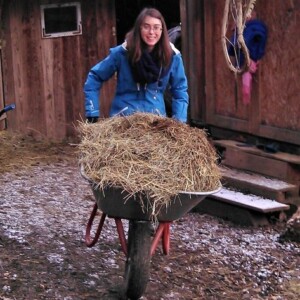
Rachel Calder
University of Birmingham
Project
Role of fungal communities in carbon and nutrient cycling in forest soils under elevated atmospheric CO2 concentrations
Supervisors
- Dr Megan McDonald (main supervisor)
- Professor Sami Ullah (co-supervisor)
PhD Summary
Mycorrhizal fungi play crucial roles in woodland ecosystems, but our knowledge of how they may be affected by predicted environmental change is limited. My project uses the Birmingham Institute of Forest Research Free Air Carbon Dioxide Enrichment facility (BIFoR FACE) to investigate how mycorrhizal fungal communities respond to elevated carbon dioxide and what implications this is likely to have for nutrient cycling. We are particularly interested in the putative capacity of mycorrhizae, which form symbiotic associations with plant roots, to enhance plants’ uptake of less-accessible forms of nitrogen. This is because nitrogen availability is predicted to become an increasingly important limiting factor in temperate woodlands as atmospheric carbon dioxide increases, curtailing the plant growth response to rising carbon dioxide levels.
Previous activity
You could say I have followed a slightly unconventional career pathway. I read history at Cambridge (2010-2013) and declared after graduation that I was “never going back into any kind of formal education again ever”. I then spent several years working in youth hostels in the Lake District, WWOOFing/Workawaying, and generally learning the kinds of things you don’t necessarily learn at university. Somehow (long story) the COVID pandemic led to me doing an MSc in Sustainable Food and Natural Resources at the Centre for Alternative Technology (CAT) in Wales, 2021-2023. Within the very broad remit of this course I developed particular interests in restoration ecology and soil science, and a keenness to take my studies further.
Why did you choose doctoral research?
My time as an undergraduate left me feeling disillusioned with academia, but doing a master’s at CAT radically changed my attitude. I thrived in the freedom to focus on the things I found important and relevant rather than having to jump through prescribed hoops in order to pass the next exam. Furthermore, I came to realise that research doesn’t have to be something confined to the “ivory tower” of academia, but can be very much targeted towards “real world” problems. At the same time, I was developing particular research interests which I wanted to pursue further, and to do so I needed to go beyond CAT. My master’s dissertation considered the role of mycorrhizal fungi in grassland restoration, but I did not have access to the lab facilities required in order properly to address the questions I was asking. This spurred me on to seek PhD opportunities that would enable me to apply my theoretical knowledge on mycorrhizae using more specialised techniques.
Why did you choose CENTA?
CENTA’s vision seemed quite closely aligned with that of CAT: both are focussed on addressing global environmental challenges. It was very much a preoccupation with the climate and biodiversity crises (and the realisation that research could be the most promising way for me personally to make any positive contribution on this front) that tempted me back into education. I also appreciated the multi-disciplinarity of CENTA, as over-specialisation (“knowing more and more about less and less”) was something that had previously put me off postgraduate study. Not only is my own project an interdisciplinary one – bridging molecular biology and soil science – I also benefit from contact with other students in my CENTA cohort working in a wide range of different fields.
Future plans
Current thinking (two months into my PhD) is that I’d like to remain in academic research, but maybe ask me again in two or three years’ time! I am beginning to think about “Plan Bs” in case this doesn’t work out or I change my mind, and science communication is another area I’d be interested in. Ultimately, I’m not too worried about lacking a specific plan at this stage, just determined to take full advantage of the training opportunities available to me as a CENTA student – this should help unlock a range of post-PhD options. I’m particularly excited about the placement and intend to use this as a way to develop my future plans, for instance by exploring an area of work that I am considering but uncertain about.
